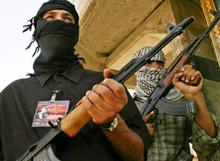
There is another interesting circumstance beyond al-Qaeda’s engagement in what has been happening in Mali — France’s involvement.
Investments certainly need to be protected, especially sources of raw materials for electric power plants. However, Mali is not the main supplier of uranium for France’s nuclear industry. France buys it in Nigeria, Gabon, Canada, the United States and elsewhere. Uranium raw material is also mined in France. The ore is processed in Pierrelatte, where one of the world’s largest uranium enrichment plants is located. From there, the raw material goes to reactors at nuclear power plants.
The main interests of French nuclear corporations nowadays are located in Nigeria, which has one fifth of the world’s uranium ore reserves. Between 2007 and 2008, its government concluded a number of agreements with the French industrial conglomerate Areva that allowed the country to sell part of the uranium mined independently. These arrangements let Nigeria become one of the world’s largest suppliers of nuclear raw material.
In the spring of 2009, Nigeria held a groundbreaking ceremony for the Imouraren uranium mine, which is to become Africa’s largest uranium mine and the second-largest open pit uranium mine in the world. After reaching full capacity, it will produce 4000-5000 tonnes per year. It is expected to be in operation for 40 years.
Then in September 2010, Islamists kidnapped six employees of the Areva group and the wife of one Areva employee in the Nigerian city of Arlit. Some of the hostages were released in 2011, and the kidnappers moved the rest to northern Mali.
The Islamists belonged to al-Qaeda, and it appears that the French nuclear industry is very interested in that organization. At least, it looks that way from outside. The terrorists explained their capture of the hostages as growing out of their acute financial need and as a reaction to actions by the French government, which had banned wearing of the veil in France.
The Tuaregs are claiming territory in northern Mali, northern Algeria and Western Libya, as well as western and northwestern Nigeria. It is in these Nigerian territories near the cities of Arlit and Agadesh that uranium is mined, and Areva is a major landowner in the region.
Suppose the Tuaregs succeed in their ambitious plans to establish the state of Azawad, and that it includes the Nigerian industrial uranium mining zones. What might that change? The Tuaregs will be unable to mine the uranium themselves, except perhaps as unskilled labor. Their only solution would be to convey the uranium deposits to a concession of foreign corporations: Chinese, Russian, American or others, but most likely the same French group. The French are the most likely candidates, unless the Tuaregs are manipulated by some third party. Beijing or, for example, Washington.
Therefore, the simplest thing for the French government would be to come to an agreement (i.e., a purchase agreement) with the Tuareg leaders rather than intervening in a fight among African peoples and risk getting bogged down in a protracted and unpromising war.

Could the Tuareg rebellion be a result of Chinese intrigue? But then al-Qaeda would have to be a Chinese project, and the Arab Spring would have had to be inspired by Beijing. However, Beijing did not demand that Gadhafi disarm and surrender. Washington and its NATO colleagues did that.
Maybe the Tuaregs began fighting in Mali exclusively for their own interests, and France sent in an expeditionary force to prevent the enterprising Berbers from ransacking the uranium companies and selling them off as scrap. However, there is a nuance in all this that has to do with the structure of France’s power industry.
Whereas in Germany the government has decided to shut down its nuclear power plants under pressure from the Greens, the situation in France is different. Neither the French government nor, incidentally, the French public intends to abandon nuclear power. France is second only to the United States in the use of nuclear plants to generate electricity. The country has 59 nuclear power plants producing 390 TWh, which represents 75.1% of its total electricity production.
Konstantin Krinitsky, a columnist for the magazine Energopolis, says France implemented its nuclear power program when the cost of electricity produced using oil jumped as oil prices rose on the world market in 1973. France’s nuclear program gave it a significant degree of independence from the oil-producing countries for relatively low production costs. France’s nuclear power plants are built by Areva, which transfers them to Électricité de France for operation. As the industry leader, Areva installs power plants in Europe, Africa, North America, China and South Korea through more than 100 sales offices and branches in 40 countries. The technological level and facilities of France’s nuclear power industry enables it to manage the full production cycle — from developing a nuclear power plant and fitting it out with its own components to final installation and startup.
So the French power industry is virtually independent of the oil and gas market — an important point— and all of its transactions are made in dollars. As we know, Iraqi president Saddam Hussein wanted to switch to Euros for oil sales. And what happened to him? He was hanged. Perhaps the events in Mali are a trial balloon. Someone or, more precisely, those who issue dollars, would obviously not oppose the return of France’s power industry to oil and gas, which Washington controls and which are pegged to the US dollar.
Konstantin Alexandrovich Penzev is an author and historian and a columnist for New Eastern Outlook.
